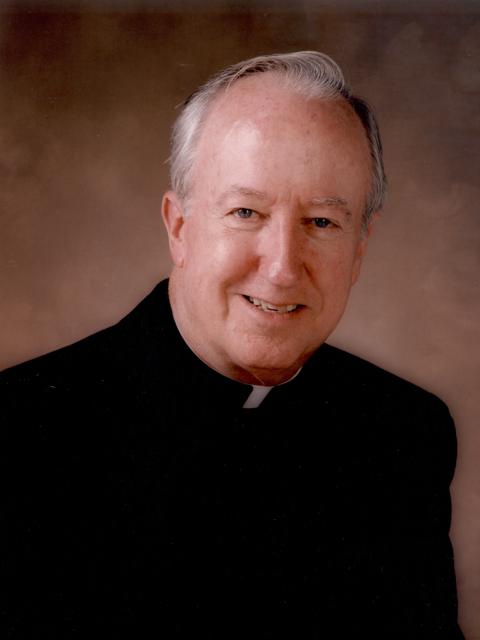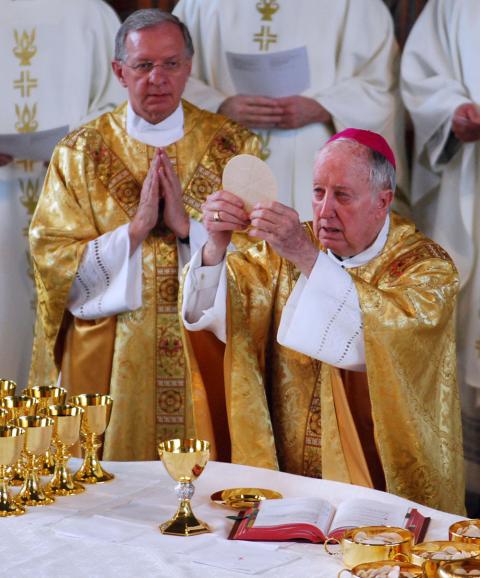
Retired Bishop John McCarthy, the third bishop of Austin, Texas, died at age 88 Aug. 18 at his residence. He is pictured in an undated photo. (CNS/courtesy Catholic Spirit)
Bishop John McCarthy, who served in Houston and Austin and provided national leadership for the church in its work to address systemic poverty, died Aug. 18 at his home in Austin surrounded by his family. He was 88.
"Let us give thanks to God for the priest and bishop that he was to so many people, here in Austin, Galveston-Houston and throughout the country and world," the diocese said in announcing his death. "Please keep his family in your prayers."
A viewing of McCarthy's body is scheduled for Aug. 23 at St. Mary Cathedral in Austin, followed by an evening prayer vigil at St. William Church in Round Rock with Austin Bishop Joe Vásquez officiating.
Retired Archbishop Joseph Fiorenza of Galveston-Houston will celebrate an afternoon funeral Mass at St. William Church.
The son of George and Grace (O'Brien) McCarthy, John Edward McCarthy was born in Houston June 21, 1930. The product of Catholic elementary school and high school, he attended St. Mary's Seminary and the University of St. Thomas, both in Houston. He earned a bachelor's degree in 1956.
On May 26, 1956, he was ordained a priest at St. Mary Cathedral Basilica in Galveston for what was then the Diocese of Galveston. (It was redesignated the Diocese of Galveston-Houston in 1959 and elevated to an archdiocese in 2004)
His ministry in the church started at St. Pius Parish in Pasadena, where he inaugurated a social ministry program at the parish. He relished telling how he would give a box of groceries to parishioners and ask them to hand deliver them to a needy family, thereby gifting the giver with a better understanding of the causes and ramifications of poverty.
He quoted James 2:24 "by our works you will know us" often during his career, which included first St. Cecilia and then All Saints parishes in Houston, before he was named in 1966 as executive director of the U.S. bishops' Committee for Spanish-speaking Catholics based in San Antonio.
In 1945 the U.S. bishops had established the committee to provide for the religious, social, economic, educational and cultural advancement of Mexican-Americans. In 1964 it merged with the U.S. bishops' Committee for Migrant Workers. One of the committee's most notable actions during then-Fr. McCarthy's tenure was support of farmworkers in improving their situation.
During a two-year stint in Washington at the U.S. bishops' conference headquarters, from 1967 to 1969, he served a year as assistant director of the conference's Social Action Department. The next year he was director of the Division for Poverty Programs at the conference.
Advertisement
He was one of the founders of what is now called the Catholic Campaign for Human Development, which is the U.S. bishops' major domestic anti-poverty effort. In the midst of a nation coming to grips with racism and systemic poverty, CCHD provided a means for local communities to fund self-help programs and hold civic leaders accountable for community improvements.
During a weekend retreat, McCarthy and other socially conscious priests hammered out the initial concepts of CCHD. In 1970, the U.S. bishops launched the Campaign for Human Development ("Catholic" was added to the name in later years).
Its mandate was to fund "such projects as voter registration, community organizations, community-run schools, minority-owned cooperatives and credit unions, capital for industrial development and job training programs, and setting up of rural cooperatives."
McCarthy returned to Houston in 1969 as pastor of St. Theresa Parish. There, he developed a "Sisters in Social Services" program which became a model adopted by Catholic Charities USA as parish social ministry. In 1973, he was named executive director of the Texas Catholic Conference, the public policy arm of the state's catholic bishops, which is now called the Texas Catholic Conference of Bishops. He was only the second executive director of the conference and served from 1973-1979.
In 1979, he was appointed an auxiliary bishop for the Archdiocese of Galveston-Houston. In 1986 he was appointed the third bishop of Austin.
He came to the diocese when its see city, Austin, was still something of a sleepy college town. The diocese had about 115,000 Catholics who gathered in 107 parishes. Bishop Vincent Harris's most quoted advice to his successor was to stay clear of the long-running rivalry between the two large universities in the diocese, the Aggies (Texas A&M) and the Longhorns (University of Texas). By the time he retired, 14 years later, there were about 400,000 Catholics and 20 more parishes.

Retired Bishop John McCarthy of Austin, Texas, celebrates Mass in 2012. McCarthy, the third bishop of Austin, died at age 88 Aug. 18 at his residence in Austin.(CNS/Donald R. Winslow)
From the start of his tenure as head of the diocese, McCarthy began a whirlwind of efforts to meet the needs of his burgeoning diocese, establishing missionary programs abroad and at home, encouraging parishes to bolster their social advocacy and charity work, and opening Catholic schools and parishes as more people moved into the Austin area.
He also launched its first synod, expanded its retreat center, established the Diocesan Law Project, which organized hundreds of volunteer attorneys and interpreters to provide free legal services to those in need, and oversaw major initiatives with a parish near Monterrey, Mexico and the Diocese of Juticalpa, Honduras.
Among his pastoral letters, he issued one in 1992 calling on Catholics in his diocese to practice compassion for all living with HIV/AIDS.
In a 1993 pastoral he addressed the entertainment industry citing the "tragic collapse of standards of decency, morality and honesty in TV, movie and popular music products.''
"The values contained in TV and other media products are supplanting church, community and even family as primary determinants of cultural norms in our society,'' he said. "We must ask ourselves: What values are being transmitted in these media products?''
Perhaps all of his work could be summed up in his signature conclusion, "Let us go forth, and let us go forth together."
After his retirement Jan. 2, 2001, McCarthy enjoyed numerous hobbies, including a blog. In 2013 he published a collection of his writings, "Off the Cuff and Over the Collar: Common Sense Catholicism." He is survived by a sister-in-law, Charlene McCarthy of Houston, and extended family.






